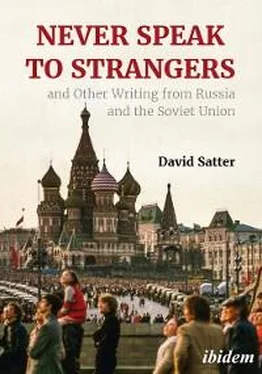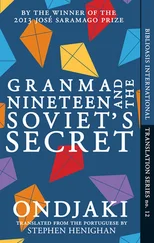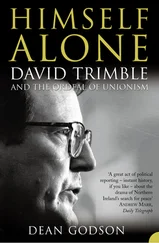The most recent reformulation of the Soviet position was the Afghan proposal on May 14, which combined the invitation to Iran and Pakistan with the existing Soviet offer to withdraw troops in return for U.S. guarantees of an end to “outside interference.”
Schmidt is now expected to arrive in Moscow on June 30 for the first visit of a Western leader to Moscow since the Afghan invasion. But despite the flurry of “peace feelers,” he has little Prospekt of achieving more than M Giscard d’Estaing in changing the Russian position on Afghanistan.
The Soviet leaders are often regarded as heavy-handed in the West, but they are frequently shrewd enough to outmanoeuvre their Western counterparts. The Soviet authorities realise that West European businessmen have no desire to make economic sacrifices to deter future Afghanistans, and the peace offensive is intended to reinforce this reluctance.
There are fundamental reasons why the peace offensive is not likely to be followed by real peace but rather a rapid doubling or trebling of the number of Soviet troops. The war is going badly for the Soviets in Afghanistan, and military observers believe that it will take a minimum of a quarter of a million men to begin to pacify the country.
This prospect might be daunting for a democratic country, but Soviet political authority is based on a supposed understanding of the iron laws of history.
The Soviet leadership cannot forsake the “Afghan revolution” after having committed troops and its own prestige to it, without undermining its own authority as well.
The damage to the West as a result of the present “peace offensive” may be serious. The inability of the U.S. to rally its allies can only convince Afghanistan’s Islamic neighbours that they have no choice but to accept the inevitable and come to terms with the Karmal government, any recognition of which would legitimise the Soviet presence.
Financial Times, Saturday, July 5, 1980
Why the Russians Think They
Have Taken Schmidt for a Ride
Masters of chess and the psychological novel, the Russians demonstrated once again this week during the visit of Herr Helmut Schmidt, the West German Chancellor, that they are more than a match for the leaders of the West.
Ever since the Soviet invasion of Afghanistan, the overriding goal of Soviet policy has been to consolidate the Soviet position in Afghanistan while defusing the atmosphere of East-West confrontation in order to ward off damaging western economic sanctions.
The official Soviet Press has indicated that Herr Schmidt deserves some of the credit for the Soviet decision to drop preconditions to talks on Euro-strategic missiles. But to the Russians the real significance of his visit was publicly in signalling that, as far as Western Europe is concerned, there is no longer a crisis over Afghanistan.
The Communist Party Newspaper Pravda , in an editorial on July 1, the day after Herr Schmidt left Moscow, made clear that the Soviet position on Afghanistan would not change. It reiterated that the Soviet Union would not consider any settlement of the Afghan crisis which fails to confirm the power of the Soviet-backed government of Mr. Babrak Karmal.
Pravda said a political settlement was possible but it depended on an end to hostile acts from “outside.” Since the Soviet authorities refer to the indigenous Afghan revolt against Marxist rule as “outside interference,” the Pravda editorial was a reaffirmation of the Soviet refusal to pull out of Afghanistan before all opposition is crushed.
There has been almost no direct Soviet comment by officials or the Press on the Schmidt visit. But Soviet newspapers have quoted foreign comment to the effect that the visit had been a “powerful impulse” to detente and mutual understanding.
That the Soviets could make this assertion, albeit indirectly, immediately after having insisted that they were not going to withdraw their forces from Afghanistan and would, if necessary, increase them, is an indication of how much the Soviets feel they have gained in the wake of Herr Schmidt’s visit.
Unlike their Western counterparts, the Soviet leaders have never agreed to summit meetings solely for an “exchange of views” except where they felt that the fact of the meeting itself could be taken to symbolise foreign acquiescence in a Soviet action such as the invasion of Afghanistan.
By his presence in Moscow, Herr Schmidt almost certainly diminished in Soviet eyes the credibility of Western objections to the invasion of Afghanistan. The impression of irresolution could only have been strengthened by West German readiness to sign a 25 year economic co-operation agreement with the Soviet Union during Herr Schmidt’s stay.
An indication of the Soviet Union’s attitude towards summit meetings can be gained from the experience of the first years in office of U.S. President Jimmy Carter. Mr. Leonid Brezhnev, the Soviet President, repeatedly refused to meet Mr. Carter after the latter began his human rights crusade. The Russians didn’t want to be put in the position of seeming to endorse the campaign, in the same way that they appear to have manoeuvred both President Giscard d’Estaing and Herr Schmidt in apparently endorsing Soviet policy through their respective summits with Mr. Brezhnev.
The Soviet agreement to negotiate on limiting medium range missiles in Europe may be taken to justify Herr Schmidt’s trip. But Western military observers have long been sceptical of the ostensible Soviet refusal to negotiate while a NATO decision to place U.S. missiles in Western Europe was in force.
The Soviet Union has between 150 and 200 highly accurate medium range SS-20 missiles with multiple warheads targeted on Western Europe. It is introducing one new SS-20 every five days. The NATO decision to deploy 572 Pershing-2 and Cruise missiles, which prompted the Soviet refusal to negotiate, was intended to counter an existing Soviet force.
Radio Moscow, in its English language world service, praised Herr Schmidt for helping to break the deadlock caused by the Soviet refusal to negotiate over the Euromissiles. The Soviet decision, however, could equally have been taken without Herr Schmidt’s presence. It was almost inevitable given NATO’s own determination to press with a matching medium range missile deployment.
The greater likelihood is that the Soviet authorities prepared a “concession” for Herr Schmidt which, like the limited Soviet withdrawal of men and equipment from Afghanistan, was heralded as an achievement.
The general East-West situation has not been fundamentally altered. Herr Schmidt, far from achieving genuine progress over Afghanistan may have only stiffened Soviet resistance by assuring the Soviets that despite their refusal to talk about Afghanistan, as evidenced by the way his remarks were censored and corrected in Pravda , the Soviet Union can still count on West German technology and goods.
Part of the difficulty in trips like those of Herr Schmidt to Moscow and M. Giscard’s to Warsaw is that they are based on the assumption that the tension over the invasion of Afghanistan exists because the Soviets do not understand the West’s position and consultation will help them understand it better. In fact, the Soviet authorities show every sign of understanding the Western position and the tenuous commitment to it at least as well as most Western leaders.
Financial Times, Saturday, July 19, 1980
An Olympian view of the Moscow games starting today
Russia Through the Looking Glass
In a macabre footnote to the pre-Olympic preparations, Soviet television viewers were surprised one night last month by the unscheduled appearance of Father Dmitri Dudko, a Russian Orthodox priest, who had been arrested six months earlier on charges of anti-Soviet agitation.
Читать дальше












